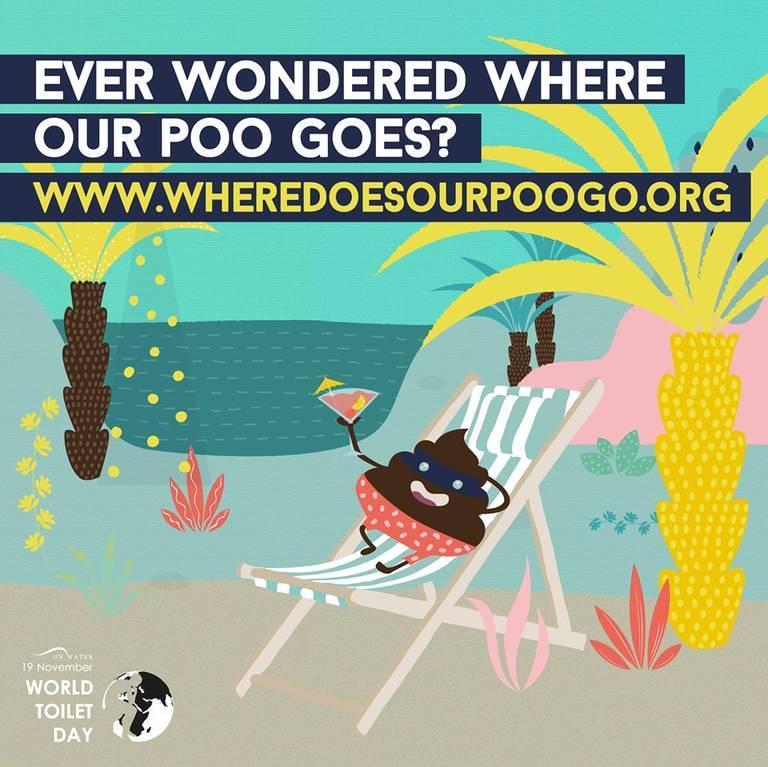
This Sunday, November 19, is World Toilet Day. First established in 2001 by the World Toilet Organization, the United Nations eventually made it one its official international days in 2013. This year, World Toilet Day's overarching theme is wastewater, with a reminder that the UN’s Sustainable Development Goals (SDGs) aim to expand clean sanitation to everyone worldwide by 2030. One objective for 2017 is to remind citizens, “Where does our poo go?” in its drive to raise awareness.
The World Health Organization (WHO) has concluded that while more people have gained access to safe water and sanitation in recent years, the statistics are still daunting. Approximately 2.3 billion people lack basic sanitation facilities such as flush toilets or latrines. Furthermore, 892 million people still defecate in the open – down from 1.1 billion in 2012, but the challenges to public health and personal safety are still a huge problem in much of the world.
Ideas for expanding clean sanitation are all over the map. The Gates Foundation, for example, has spearheaded competitions and conferences in an attempt to find solutions that will create a safe place for people to relieve themselves while also being low-impact and sustainable. Water.org’s WaterCredit program includes a program that helps women build private toilets in their communities. Transforming all that poo into energy is also an idea often proposed, as in the case of an ongoing pilot project in Madagascar.
As more companies align their strategies with the SDGs, raising awareness about the need for improved sanitation is one way in which businesses can help solve this problem - while educating their stakeholders about this ongoing challenge as well.
One such company is Kimberly-Clark, which for the past few years has supported local NGOs across the world in order to improve sanitation in developing countries. In 2014, the consumer packaged goods (CPG) giant first launched its “Toilets Save Lives” program in the United Kingdom. Since then, the initiative has expanded to over 15 countries in which Kimberly-Clark conducts business. Joining the efforts of organizations including UNICEF, WaterAid and Water for People, the program offers funding and expertise that builds and repairs toilets where they are needed. Kimberly-Clark and its partner NGOs also support hygiene and public health education programs.
The company recently claimed Toilets Change Lives helped improve the lives of at least 500,000 people worldwide. By 2022, the program seeks to make the lives of 25 million people better by boosting access to clean sanitation and empowering women and girls – the safety of whom is especially at risk when they have to find a place to relieve themselves out in the open.
Kimberly-Clark says it is also supporting next-generation technologies in order to improve sanitation. Those efforts include mentoring programs at the Toilet Board Coalition, which includes an “accelerator” that scopes out entrepreneurs who believe they have ideas that can scale and expand access to safe and clean sanitation. One example of this work is an ongoing partnership with a South African company, BioCycle, that seeks to scale up a process that uses fly larvae to turn human waste into animal feed or biodiesel.
While the loss of dignity and personal safety is partly driving efforts to improve sanitation, ongoing public health threats behoove governments, businesses and nonprofits to find new ways to manage human waste safely and effectively. The WHO has estimated that as much as 10 percent of the world’s population is eating food irrigated by wastewater; and at least 280,000 deaths each year is linked to diarrhea triggered by poor sanitation.
Image credit: UN-Water/Flickr

Leon Kaye has written for 3p since 2010 and become executive editor in 2018. His previous work includes writing for the Guardian as well as other online and print publications. In addition, he's worked in sales executive roles within technology and financial research companies, as well as for a public relations firm, for which he consulted with one of the globe’s leading sustainability initiatives. Currently living in Central California, he’s traveled to 70-plus countries and has lived and worked in South Korea, the United Arab Emirates and Uruguay.
Leon’s an alum of Fresno State, the University of Maryland, Baltimore County and the University of Southern California's Marshall Business School. He enjoys traveling abroad as well as exploring California’s Central Coast and the Sierra Nevadas.














